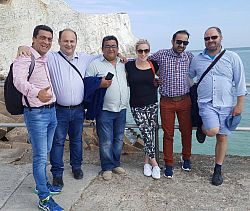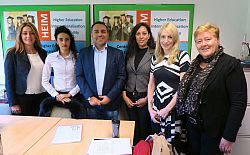 Summer School
Summer School
Dr Emily Danvers coordinated the summer school ‘Research Methodologies Training for Equality and Diversity’ from 28 June-29 July 2017 which comprised a programme of scholarly activities designed to support Roma scholars and those researching Roma. The summer school was part of HEIM Work Package 6 and the two key aims were for participants to 1. Consolidate and enhance research competencies and communications skills culminating in the production of reflective think pieces about Equality, Diversity and Internationalisation and 2. Present their research at a CHEER international conference ‘Disrupting International Discourses: Discussing Equity and Inclusion’.
Five participants attended: Imre Balong,University of Pécs, Hungary; Dezso Mate, Eotvos Lorand University, Hungary; Radu Lacatus, Babes- Bolyai University, Romania; Ion Goracel, Western University of Timisoara, Romania and Tom Bass from the Roma Education Fund, Budapest, Hungary.
The programme included research communication workshops with expert trainer Bianca Bailey from Imperial College, London, including ‘Using Blogs and Social Media to Promote your Research’, ‘Presentation and Poster Presentation skills’ and ‘Presenting with style, flair and presence’. Colleagues from the Doctoral School led sessions on ‘Practical assertiveness for researchers’ and ‘Cascading knowledge and facilitating institutional change’. Alison Chisholm, Senior Teaching Fellow with the Sussex Centre for Language Studies, delivered workshops on academic writing and CHEER Research Fellow, Dr Charlotte Morris, facilitated a reading group on equality, diversity and internationalisation. Dr Emily Danvers provided additional tutorials, support and guidance on developing reflective writing on these key themes.
The scholars attended a variety of relevant academic seminars, social and networking events at the university; contributed to the expert meeting entitled ‘Marginalised Minorities in Higher Education: The Case of Gypsy, Roma and Traveller Communities’ and successfully presented their work at ‘Disrupting Internationalisation Discourses: Discussing Equity and Inclusion'. Overall, the summer school was a productive space to exchange knowledge with researchers and colleagues working in different international contexts and to reflect on how the concepts of ‘equity, diversity and internationalisation’ might apply to Roma.
The programme evaluated well with positive comments about their experience including the following:
‘This was very valuable time to reflect, learn from the UK experience with diversity and equality and remind myself that I'm indeed a critical thinker’.
‘The learning infrastructure (Library) and access to online information was amazing.’
‘Meeting with lecturers and doctoral researchers and representatives from local NGOs was really valuable’.
‘I met a lot of academic concepts which are not reachable in our countries’.
‘Appreciated not being overloaded but given time to reflect’.
‘I have clarified some concepts related to my research and have improved my academic writing’.
‘I have a new view of the academic world – really developed my knowledge’.
 Visit to CHEER and the University of Sussex by Roma Scholars
Visit to CHEER and the University of Sussex by Roma Scholars
In November 2016, CHEER welcomed three visitors: Danut Dumitru (Director of Advocacy, Roma Education Fund, Romania), Gabriela Petre (PhD Researcher, Romania) and Albena Velcheva (PhD Researcher, Bulgaria). Their visit was an extension of Part 1 of Work Package 6 Research Methodologies Training for Equality and Diversity which involved Roma scholars working with academic colleagues and students at the University of Sussex to engage with research methodologies training around issues of internationalisation, equality and diversity.
In this visit, Danut, Gabriela and Albena met with colleagues from the Widening Participation team at Sussex to share best practice and ideas for supporting marginalised groups to access higher education opportunities across Europe. This meeting helped generate ideas for the knowledge exchange activities held at the University of Sussex in July 2017. They also contributed to the HEIM film.
Network of Roma Early Stage Researchers
In May and June 2016, Professor John Pryor (CHEER, University of Sussex), Caterina Mazzilli (PhD Researcher, Migration Studies, University of Sussex), Daniel Leyton (PhD Researcher, CHEER, University of Sussex) and Alejandro Soria-Vílchez, (University of Seville), were seconded to the headquarters of the Roma Education Fund (REF) in Budapest to develop a network of Roma Early Stage Researchers. They worked in close contact with the REF Scholarship Programme’s team composed of Dan Doghi (Higher Education Programme Manager), Erzsébet Bader (Scholarship Programme Officer), and Merziha Idrizi (Scholarship Programme Officer).
The purpose of the Network - established in the form of a Facebook Group (login required to view) is to provide a platform where Roma Early Stage Researchers can share information, opinions and views on their studies and investigations and, additionally, provide new possible opportunities of collaboration, mutual help and peer support.
The Network currently boasts 108 members from diverse backgrounds such as Albania, Bulgaria, Croatia, Czech Republic, Hungary, Kosovo, Macedonia, Moldova, Romania, Serbia, Slovakia, Russia, Turkey, and Ukraine - all of which are linked to the REF Scholarship Programme and/or the HEIM project. When identifying prospective members, the Sussex and REF teams decided to include previous and current postgraduate (MA and PhD) students who have been beneficiaries of REF and have a good command of the English language. This last requirement was essential to relate to the other participants from a different nationality and studying or working in a different part of the world.
The posts to the group refer to scholarships, internships, job opportunities, summer schools and conferences and publications, or news regarding Roma issues and activism raising awareness, reclaiming voice and recognition of Roma history of resistance. Participants also use the platform to encourage collaboration within the community and collective work on social justice.
Example posts include:
"I believe that cooperation is important…there could be formed a group of legal experts in human rights…and deal with violation of rights of Roma across Europe."
"I totally agree and support this initiative. It could be good if we could also exchange opinions and our work…Moreover, this group can serve as a platform for international young Roma experts…for relevant Roma issues."
A follow-up visit in 2017 allowed Professor John Pryor and Alejandro Soria-Vílchez time to develop a resource base on the Roma in Education and on Internationalisation.
Work Package 1: Internationalisation with Equity and Diversity? - Two members of the Roma Education Fund: Beate Olahova (from 1 September) and Anasztázia Nagy (from 1 October) were on secondment at the University of Seville for two months each in order to produce guidelines on reflexive internationalisation.
Work Package 4: Supporting Roma Students in Higher Education - This enabled doctoral researchers Emily Danvers from the University of Sussex, Anders Norberg from Umea University and Alejandro Soria-Vílchez from the University of Seville to familiarise themselves with Roma issues in higher education while working in the Roma Education Fund - the leading NGO in the field, and to produce written reports about Roma accessing higher education in their respective countries:
- REPORT - Roma in higher education: A case study of successful trajectories at the University of Seville
- REPORT - Good Practice for Widening the Participation of Roma in Spanish Higher Education [PDF 877.16KB]
- REPORT - Roma, Education, and Higher Education policies: The International Context and the Case of Sweden [PDF 602.41KB]
- REPORT - Supporting Roma Students in Higher Education: Briefing Report on Higher Education, Internationalisation and Roma in the UK [PDF 1.25MB]
Work Package 5: Researching Marginalised Minorities in Higher Education Institutions: Policies and Practice - Delivered country specific briefing papers on Roma access to higher education (Sweden, Spain, UK). Early Stage and Experienced Researchers from the Roma Education Fund were seconded to the Universities of Seville, (Stela Garaz and Ilona Notar), to the University of Sussex (Stela Garaz and Gabriella Petre), and to Umea University (Merziha Idrizi and Ljubica Tomic). They worked with researchers based in each of the three universities to produce reports on widening participation polices in practices in their respective countries:
- REPORT - Marginalized Minorities in Higher Education in Spain: Policies and Practice [PDF 2.39MB]
- DRAFT REPORT - Researching Marginalized Minorities in Higher Education in Sweden and the Case of Roma: Policies and Practice [PDF 1.30MB]
- REPORT - Researching Marginalized Minorities in UK Higher Education and the Case of Roma: Policies and Practice [PDF 1.19MB]
Work Package 6: Research Methodologies Training for Equality and Diversity - Early Stage Researchers attended the University of Sussex for three visits over two years to develop their research skills in Equality and Diversity. This involved the production of the following papers:
- HEIM RESEARCHER THINK PIECE: The first sparks of Romani LGBTQ (Dezso Mate) [PDF 436.98KB]
- HEIM RESEARCHER THINK PIECE: Do “National Roma Integration Strategies: a first step in the implementation of the EU Framework” achieve goals in Housing of Roma in Hungary? (Imre Balog) [PDF 419.23KB]
- HEIM RESEARCHER THINK PIECE: Mind the Gap: Promoting Social Inclusion in Higher Education at the International Level (Radu Lacatus) [PDF 283.69KB]
- HEIM RESEARCHER THINK PIECE: Go After the World - Creating a Roma education movement (Tom Bass) [PDF 303.45KB]
- HEIM RESEARCHER THINK PIECE: The Impacts of Internationalisation on Roma Civil Society in Romania (Ion Goracel) [PDF 189.16KB]


